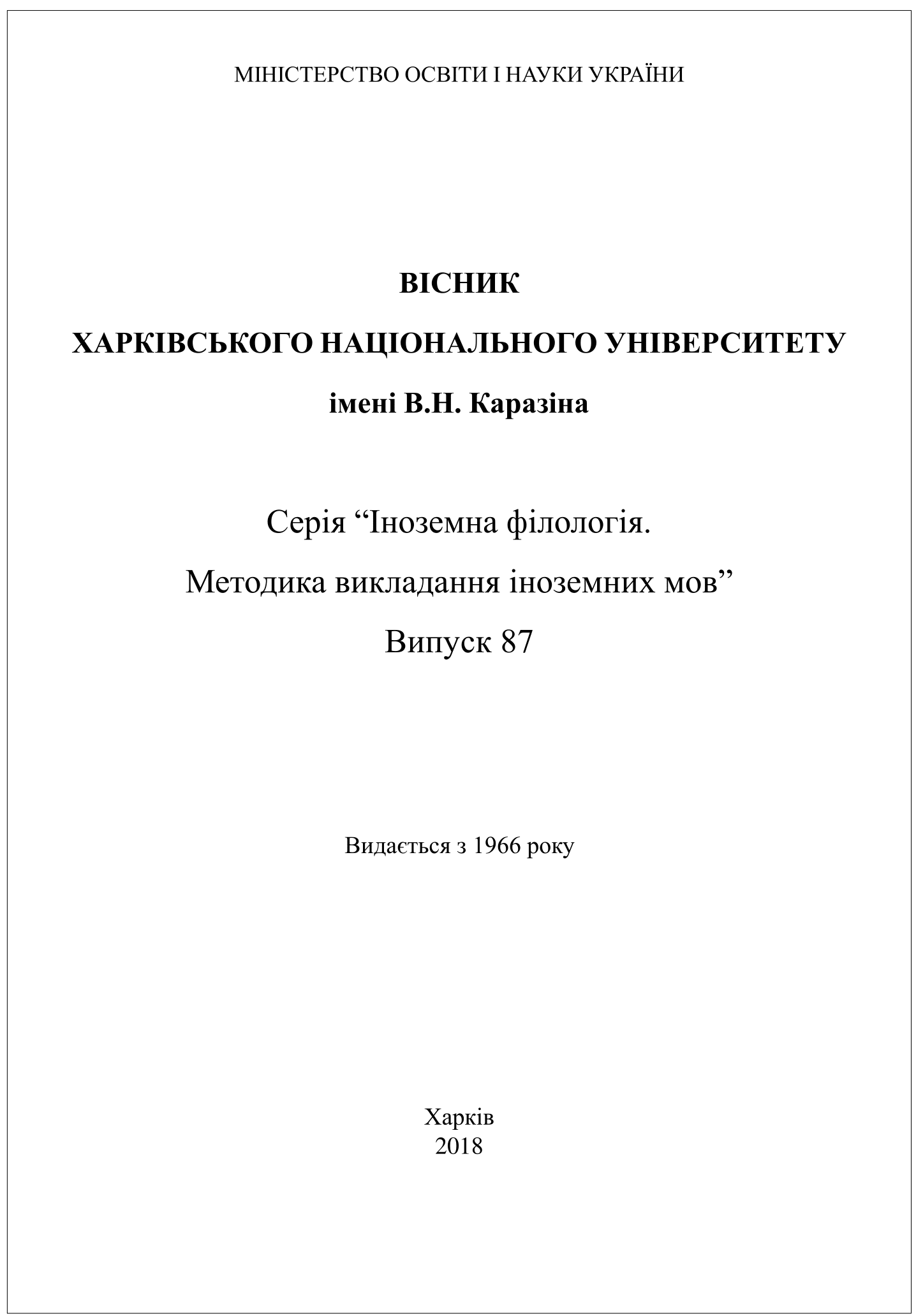Висловлення як одиниця аналізу стратегії самопрезентації в англомовному дискурсі
Анотація
У статті розглянуто характеристики висловлень-самопрезентем та способи їхньої ідентифікації в англомовному діалогічному дискурсі. Розуміння самопрезентації як дискурсного явища та як дискурсивної стратегії вказує на те, що саме висловлення виступає у ролі самопрезентеми. Висловлення-самопрезентеми спираються на концептуальну основу – ідентифікаційний фрейм. Ці висловлення будуються за синтаксичною моделлю Pronoun (1st person sing/pl) + be + Noun. Експліцитні висловлення-самопрезентеми формуються на основі варіантів цієї моделі, імпліцитні висловлення-самопрезентеми можуть бути трансформовані в такі, що сформовані на основі варіантів цієї моделі. Ідентифікація висловлень-самопрезентем в англомовному діалогічному дискурсі залучає використання контекстуального аналізу, який виявляється необхідним для імпліцитних висловлень-самопрезентем та експліцитних висловлень-самопрезентем, що містять займенник першої особи множини (групові самопрезентеми).
Завантаження
Посилання
Babyre, O.V. (2014). Persuazyvni i manipuliatyvni stratehii anhlomovnoi komunikatsii z ekotematyky. Avtoref. dys. kand. filol. nauk [Persuasive and manipulative strategies of English-language communication in the frameworks of eco-thematics. Cand. philol. sci. diss. synopsis]. Kyiv. 20 p. (in Ukrainian).
Bezuhla, L.R. (2007). Verbalizatsiia implitsytnykh smysliv u nimetskomovnomu dialohichnomu dyskursi: monohrafiia [Verbalization of Implicit Meanings in German-language Dialogic Discourse: monograph]. Kharkiv: KhNU imeni V.N. Karazina. Publ.
Blakar, R.M. (1987). Jazyk kak instrument social'noj vlasti [Language as an Instrument of a Social Power]. In: V.V. Petrov (ed.). Jazyk i modelirovanie social'nogo vzaimodejstvija [Language and Modeling of Social Interaction]. Moscow: Nauka Publ., pp. 88–125.
Bohatyrova, Ye.V. (2014). Prahmastylistychni kharakterystyky anhlomovnykh peredvyborchykh politychnykh debativ. Avtoref. dys. kand. filol. nauk. [Pragmastylistic Characteristics of the English-language Electoral Political Debates. Cand. philol. sci. diss. synopsis]. Zaporizhzhia. 20 p. (in Ukrainian).
Bondarenko, E.V., Martynjuk, A.P., Frolova, I.E, and Shevchenko, I.S. (2017). Kak narisovat' portret pticy: metodologija kognitivno-kommunikativnogo analiza jazyka [How to draw a portrait of a bird: methodology of the cognitive communicative analysis of a language]. Kharkiv: KhNU imeni V.N. Karazina. Publ.
Burns, R.B. (1982). Self-Concept Development and Education. Holt, Rinehart and Winston: Education.
Kobozeva, I.M. (2000). Lingvisticheskaja semantika: uchebnik [Linguistic Semantics: text-book]. Moscow: Jeditorial URSS Publ.
Naumenko, L.P. (2017). Suchasnyi anhlomovnyi biznes-dyskurs: komunikatyvno-prahmatychne ta linhvokulturne modeliuvannia. Dys. dokt. filol. nauk: [The Contemporary English Business Discourse: Communicative-Pragmatic and Linguistic Conceptual Modelling. Dr. philol. sci. diss.]. Kyiv. 515 p. (in Ukrainian).
Nikitin, M.V. (1988). Osnovy lingvisticheskoj teorii znachenija [Basis of Linguistic Meaning Theory]. Moscow: Vysshaja shkola Publ.
Oljanich, A.V. (2004). Prezentacionnaja teorija diskursa [Presentational Theory of Discourse]. Volgograd: Peremena-Politehnik Publ.
Paducheva, E.V. (2002). Vyskazyvanie i ego sootnesennost' s dejstvitel'nost'ju (referencial'nye aspekty semantiki mestoimenij) [Utterance and its Correlation With Reality (Referential Aspects of the Semantics of Pronouns )]. Moscow: Jeditorial URSS Publ.
Pikuljova, O.A. (2005). Samoprezentacija lichnosti v processe social'nogo vzaimodejstvija [Self-Presentation of a Personality in the Process of Social Interaction]. Vestnik Sankt-Peterburgskogo universiteta. Ser. 6: Filosofija. Kul'turologija. Politologija. Pravo. – Saint-Petersburg University Messenger. Series 6. Philosophy. Cultural Studies, Politology. Law, 1, 85–91 (in Russian).
Pochebut, L.G., and Mejzhis, I.A. (2010). Social'naja psihologija [Social Psychology]. St.Petersburg: Piter Publ.
Rickheit, G., and Strohner, H. (1993). Grundlagen der kognitiven Sprachwissenschaft. Tübingen, Basel: Francke.
Schiffrin, D. (1994). Approaches to Discourse. Oxford: Blackwell.
Schwarz, M. (1990). Einführung in die kognitive Linguistik. Tübingen: Franke.
Shevchenko, I.S. (1998). Istoricheskaja dinamika pragmatiki predlozhenija. Anglijskoe voprositel'noe predlozhenie 16–20 vv.: monografija [Historical Dynamics of the Sentence Pragmatics: monograph]. Har'kov: Konstanta Publ.
Ushchyna, V.A. (2003). Sotsiolinhvistychna katehoriia dominantnosti ta yii realizatsiia v anhlomovnomu politychnomu dyskursi. Avtoref. dys. kand. filol. nauk [The Social Linguistic Category of Dominancy and Its Realization in English-language Political Discourse. Cand. philol. sci. diss. synopsis]. Kyiv. 20 p. (in Ukrainian).
Zhabotinskaja, S.A. (2010). Lingvokognitivnyj podhod k analizu nominativnyh processov [A cognitive linguistic approach to the process of naming]. Visnyk Kharkivskoho natsionalnoho universytetu imeni V. N. Karazina. – V.N. Karazin Kharkiv National Univ. Messenger, 928, 6–21 (in Ukrainian).




